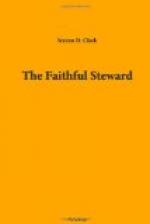I would premise, however, that these intellectual views may also be regarded as inducements to munificence, and thus to the adoption of an individual system, fitted to each one’s peculiar relations; for they will thus operate from the nature of the case; the very object of fastening them systematically in the understanding being, that penetrating to the heart, and binding themselves on the conscience, they may lead on to rational activity.
1. We should bear in mind that we were not made for ourselves, but for the service of God. Let the truth, “Thou art God’s,” be written with fire on the heart, as well as its legitimate consequence, that all that appertains to our being is his;—our strength, our health, our powers of reason and love, our capacities of acquisition, our property, our time, our all, so that its thrilling accents, “All that thou hast is God’s,” will ring in our ears at every turn. As Jehovah created us for himself, has preserved us for himself, and redeemed us for himself, we ought at once to acknowledge his claim and devote ourselves to his service. This self-surrender is the true foundation of all giving to the Lord. Any system of beneficence not built on this must crumble. Giving one’s self is an earnest and pledge that everything else will be given; on the contrary, while self is withheld, there is no warrant that our possessions will be yielded, much less that God will accept the offering. But self being surrendered, all is virtually conveyed over to the Lord and sealed forever his.
2. That all right feeling is feeling as God does in the same circumstances, and in respect to the same objects. There must be a holy sympathy of soul with him,—a oneness of affection, of desire, of will, of purpose. We must feel concerning ourselves as God does, who desires to see our hearts burning with the same hallowed love that fills his own. We must feel concerning sinners as the Father does, “who so loved the world that he gave his only-begotten Son, that whosoever believeth in him should not perish, but have everlasting life;”—as the Son, who exchanged the abodes of peace for the abasement of flesh and the agonies of the cross;—as the Holy Ghost, who is willing to dwell in our polluted hearts, consuming the dross with his own vital energies. We must imitate the angels, who, sympathizing with the Triune Jehovah, strike their lyres with new and more rapturous hallelujahs at the repentance of the returning sinner. No other feelings in kind or strength, in proportion to our capacities, are right feelings. The sacrifices of Christ were, indeed, stupendous; but we must be willing to make as disinterested sacrifices for a perishing world; else we are not in sympathy with our crucified Lord. Let us often visit the scenes of his sufferings, hear the groans of Gethsemane, and witness the blood and agony of the cross, and there learn what it means to have the same mind “which was also in Christ Jesus.” Let us make this love the great standard of feeling and action, and cultivate the habit of trying ourselves by this, and this alone; inquiring daily, “Oh, am I benevolent as Christ?” “Do I sympathize with him over a ruined world?”




